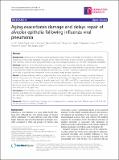Aging exacerbates damage and delays repair of alveolar epithelia following influenza viral pneumonia
Author(s)
Yin, Lu; Zheng, Dahai; Limmon, Gino V.; Leung, Nicola H. N.; Xu, Shuoyu; Rajapakse, Jagath C.; Yu, Hanry; Chow, Vincent T. K.; Chen, Jianzhu; ... Show more Show less
Downloads12931-014-0116-z.pdf (4.537Mb)
PUBLISHER_CC
Publisher with Creative Commons License
Creative Commons Attribution
Terms of use
Metadata
Show full item recordAbstract
Background
Influenza virus infection causes significantly higher levels of morbidity and mortality in the elderly. Studies have shown that impaired immunity in the elderly contributes to the increased susceptibility to influenza virus infection, however, how aging affects the lung tissue damage and repair has not been completely elucidated.
Methods
Aged (16-18 months old) and young (2-3 months old) mice were infected with influenza virus intratracheally. Body weight and mortality were monitored. Different days after infection, lung sections were stained to estimate the overall lung tissue damage and for club cells, pro-SPC+ bronchiolar epithelial cells, alveolar type I and II cells to quantify their frequencies using automated image analysis algorithms.
Results
Following influenza infection, aged mice lose more weight and die from otherwise sub-lethal influenza infection in young mice. Although there is no difference in damage and regeneration of club cells between the young and the aged mice, damage to alveolar type I and II cells (AT1s and AT2s) is exacerbated, and regeneration of AT2s and their precursors (pro-SPC-positive bronchiolar epithelial cells) is significantly delayed in the aged mice. We further show that oseltamivir treatment reduces virus load and lung damage, and promotes pulmonary recovery from infection in the aged mice.
Conclusions
These findings show that aging increases susceptibility of the distal lung epithelium to influenza infection and delays the emergence of pro-SPC positive progenitor cells during the repair process. Our findings also shed light on possible approaches to enhance the clinical management of severe influenza pneumonia in the elderly.
Date issued
2014-09Department
Massachusetts Institute of Technology. Department of Biological Engineering; Massachusetts Institute of Technology. Department of Biology; Koch Institute for Integrative Cancer Research at MITJournal
Respiratory Research
Publisher
BioMed Central Ltd
Citation
Yin, Lu, et al. "Aging exacerbates damage and delays repair of alveolar epithelia following influenza viral pneumonia." Respiratory Research 2014, 15:116.
Version: Final published version
ISSN
1465-9921